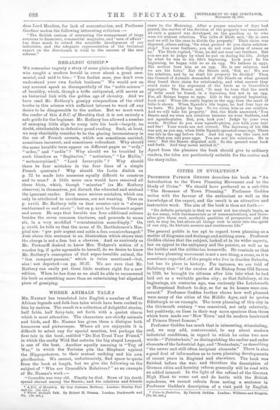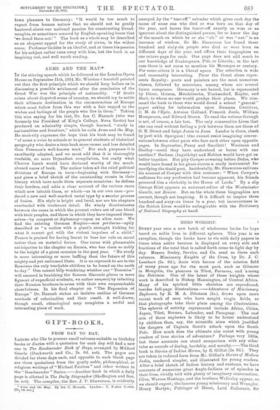CITIES IN EVOLUTION.*
PROFESSOR PATRICE GEDDES describes his book as "An Introduction to the Town Planning Movement and to the Study of Civics." We should have preferred as a sub-title "The Romance of Town Planning:" Professor Geddes writes with the fervour of the enthusiast as well as the knowledge of the expert, and the result is an attractive and instructive work. The aim of the book is thus set forth:—
"Its definite principle is that we must not too simply begin, as do too many, with fundamentals as of communications, and there- after give these such aesthetic qualities of perspective and the rest, as may be, but above all things seek to enter into the spirit of our city, its historic essence and continuous life."
The general public is too apt to regard town planning as a matter of diagrams and drainage and nothing more. Professor Geddes claims that the subject, looked at in its wider aspects, has an appeal to the antiquary and the painter, as well as to
the builder and the utilitarian housewife. He reminds us that the town planning movement is not a new thing, a craze, as it is sometimes regarded, of the people who live in Garden Suburbs, but has its place in history. For instance, we are told of Salisbury that "at the exodus of its Bishop from Old Sarum in 1220, he brought its citizens after him into what 1 had laid out as a veritable garden city ; so that Salisbury, at its beginnings, six centuries ago, was curiously like Letchworth or Hampstead Suburb to-day, so far as its homes were con. cerned." Professor Geddes further shows how well planned were many of the cities of the Middle Ages, and be quotes Edinburgh as an example. The town planning of this city in the thirteenth century "was conceived, not only relatively, but positively, on lines in their way more spacious than those which have made our' New Town' and its modern boulevard of Princes Street famous."
Profesior Geddes has much that is interesting, stimulating, and, we may add, controversial, to say about modern industrial conditions, in regard to which he coins two new words—"Paleotechnic," as distinguishing the earlier and ruder elements of the Industrial Age, and "Neotechnic," as describing "the newer and still often incipient elements." There is also a good deal of information as to town planning developments of recent years in England and elsewhere. The book was finished before the war, and therefore the description of German cities and housing reform generally will be read with an added interest. In the light of the refusal of the German.
High Fleet to come out and do battle with the Britisk squadrons, we cannot refrain from noting a sentence in
Professor Geddes's description of a visit paid by English * cities in Evolution. By Patrick Geddes. London: Williams and Norgate. Ps. 6d. net.] town planners to Germany: "It would be too much to expect from human nature that we should not bo gently bantered about our national 'passion for constructing Dread- noughts, or sometimes assured by English-speaking hosts that 'we dread them not.' " The book as a whole may be described as an eloquent appeal for the study of civics, in the widest sense. Professor Geddes is an idealist, and at times his passion for his subject rather runs away with him, bat the book is an inspiring one and well worth reading.















































 Previous page
Previous page